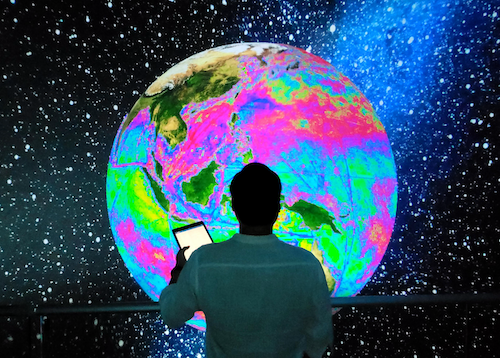Campus News
Sensorium, a new project of UC Santa Cruz’s Center for the Study of the Force Majeure, to be an unprecedented experience of the world ocean
A new project in development by UC Santa Cruz’s Center for the Study of the Force Majeure will give the public a transformative opportunity to interact with the world’s ocean ecosystem in a fully immersive work of environmental art entitled Sensorium.

What if the world ocean had a voice. What would you ask it? What might it want to say to you in this moment of environmental peril? A new project in development by UC Santa Cruz’s Center for the Study of the Force Majeure will give the public a transformative opportunity to interact with the world’s ocean ecosystem in a fully immersive work of environmental art entitled Sensorium.
Conceived of by the late, great eco-art pioneer Newton Harrison, Emeritus Professor, UCSC and UCSD and founder of The Center for the Study of the Force Majeure with his late wife and longtime collaborator Helen, Sensorium is both a work of art and of science that sets out to synthesize the survival problems that the world ocean faces in our emerging heat shocked future. It is being designed to be a physically high presence, immersive, interactive space with total surround imagery that invites participants to “walk the world ocean.” Visitors are encouraged to interact with it, ask it questions, listen to its voiced response, hear its challenges, and discover fresh new insights for ocean recovery solutions.
Sensorium will debut in 2024 at UC Irvine’s eXperimental Media Performance Lab as part of Pacific Standard Time, a Southern California-wide cultural initiative spearheaded by the Getty Foundation to explore the intersections of art and science in a global dimension.
Sensorium is being developed by Joshua Harrison, Director of the Center for the Study of the Force Majeure and the Harrisons’ son, together with the Director of The AlloSphere at UC Santa Barbara and Distinguished Professor JoAnn Kuchera-Morin Ph.D., Juliano Calil of Virtual Planet Technologies, and the Directors of the European Center for the Force Majeure, Kai Reschke and Petra Kruse. Other research partnerships have been established with the Ocean Health Index at UCSB, the Potsdam Institute for Climate Impact Research, the Alfred-Wegener-Institut, Bremerhaven, and the German Climate Computing Centre, Hamburg.
“The history of artistic creation suggests an alternative pathway to learning and discovery, one that relies on intuition, on the power of free association, and the value of shifting perspectives and paradigms,” says Joshua Harrison. “We believe that new and creative answers to questions regarding the ocean’s ability to regenerate and return to ecological well-being will emerge from integrating core artistic concepts and creative strategies with current scientific resources and modeling, generating a new synthesis that builds on the strengths of the underlying science and the perspective of the artistic experience. Sensorium is designed as a deeply felt experience, and a whole systems solution laboratory that evokes creativity in students, general audiences, and scientists alike.”
It is this deeply interdisciplinary approach that distinguishes the work of The Center for the Study of the Force Majeure. Founded by the Harrisons in 2007 within UCSC’s Arts Division, the education and research center brings together artists and scientists in diverse disciplines to design ecosystem-adaptation projects in critical regions around the world to respond to climate change. The Center focuses on “pre-emptive planning”—developing strategies that forestall, adapt to, or mitigate the challenges emerging over the next 50–100 years. The UCSC Arboretum is the site of one of the Center’s Future Gardens projects, where the team propagates plant ensembles inside three Buckminster Fuller domes to test for resilience at a 50-year predicted temperature increase of 3–4 degrees celsius.
Sensorium, unprecedented in its magnitude and complexity, is the ambitious capstone of Newton Harrison’s career and life. He recently died in 2022. Among the leading pioneers of the eco-art movement, Harrison and his wife Helen worked for almost forty years with biologists, ecologists, architects, urban planners, and other artists to uncover ideas and solutions to support biodiversity and community development. The Harrisons’ concept of art embraced a breathtaking range of disciplines. They were historians, diplomats, ecologists, investigators, emissaries, and art activists. Their visionary projects often led to changes in governmental policy and expanded dialogue around previously unexplored issues leading to practical implementations throughout the United States and Europe. A major retrospective of their work will take place in 2024 at the La Jolla Historical Society as part of Pacific Standard Time as well.
The Center gratefully acknowledges the Irwin and Joan Jacobs family fund and the Metabolic Studio of the Annenberg Foundation for their generous support of Sensorium.